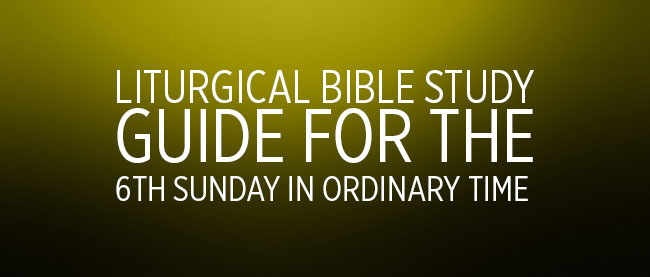Gospel – Luke 6:17, 20-26
Last week we heard Simon’s call to be a follower of Jesus; with all the implications of being a follower which, in Luke’s gospel is absolute renouncement. Simon, James and John left everything on the seashore to follow Jesus.
After recruiting Simon, James and John, Jesus continued His ministry in Galilee: healing a leper and a paralytic, enraging the Pharisees and scribes by forgiving the person’s sins – something only God can do. He then recruited Levi (Matthew), the tax collector, as a follower; further arousing the ire of the Pharisees and scribes by socializing with “sinners.” To this Jesus responded “It is not the healthy who needs a doctor, but the sick.” The Pharisees then questioned why Jesus’ disciples didn’t fast and pray as did their own disciples as well as those of John the Baptist. They also observed the disciples gathering wheat to eat on the Sabbath.
The Pharisees and scribes were now looking for a reason to accuse Jesus and observed Him heal a man with a withered hand; again on the Sabbath. Work on the Sabbath is forbidden and certainly gathering wheat and healing are forms of work.
Jesus then went out to a mountainside to pray, and spent the night praying to God. When morning came, He called His disciples to Him and chose twelve of them, whom He also designated apostles: Simon, his brother Andrew, James, John, Philip, Bartholomew, Matthew, Thomas, James son of Alphaeus, Simon the zealot, Judas son of James, and Judas Iscariot. He then came down the mountain with them and delivered the sermon on the plain which is our reading for today.
The parallel gospel to this time period is Matthew 5 through 7 which is called the Sermon on the Mount. This portion of the sermon is called the “beatitudes (blessings) and curses.”
1st Reading – Jeremiah 17:5-8
Jeremiah began his office of prophet 116 years after Isaiah began his, and about 620 years before the birth of Jesus the Christ. Jeremiah lived through one of the most troubled periods of the ancient Near East as he witnessed the fall of a great empire (Assyria) and the rising of one even greater (Babylon). In the midst of this turmoil, the kingdom of Judah, then in the hands of deplorable kings, came to its downfall by resisting this overwhelming force of history.
The last decades of Judah’s history required a continual flow of light from Yahweh’s messengers; in addition to Jeremiah, the prophets Zephaniah, Habakkuk, Nahum, and Ezekiel delivered the word of God.
The two predominant themes of Jeremiah’s message are to precisely define true Yahwehism, and to proclaim the imminent wars as punishments of Judah’s aberrations. Today’s reading falls into the category of true Yahwehism and is a wisdom saying on true justice.
2nd Reading – 1 Corinthians 15:12,16-20
Today’s second reading continues the teaching we heard last week on the resurrection of the dead. Last week we heard the creed of the Church: Christ died for us, He was buried, He rose on the third day.
Christ’s resurrection is the crowning event of salvation history and man’s victory over sin, Satan, and death. As Adam brought death, Christ brings resurrection from the dead.
The Christian is incorporated into Christ by baptism and shares in His risen life. This final fruit of redemption in Christ will be realized for the Christian at the Lord’s parousia when the dead rise in their glorified bodies.


